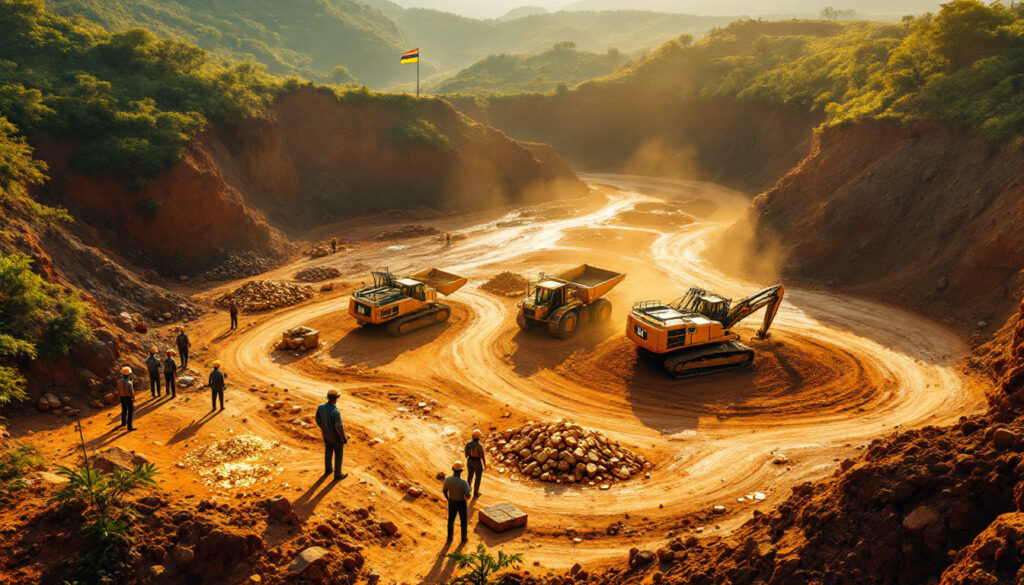Congo Gold Miner Halts Operations: Understanding the M23 Tax Dispute
Twangiza Mining, a significant gold producer in eastern Democratic Republic of Congo (DRC), has suspended operations following tax demands from the M23 rebel administration now controlling South Kivu Province. This development marks a critical turning point in the ongoing power struggle over mineral resources in one of Africa's most resource-rich regions.
The suspension not only affects local employment and regional economic stability but raises important questions about resource governance, international mining operations in conflict zones, and the future of strategic mineral extraction in contested territories. Recent all-time high gold prices analysis adds further complexity to this situation as suspended operations could impact global markets.
What is Happening with Twangiza Mining in the Congo?
Twangiza Mining, a major gold producer in eastern DRC, officially suspended all mining operations on May 8, 2025, following directives issued by the M23 rebel administration that recently seized control of South Kivu Province. According to an internal company letter signed by General Director Chao Xianfeng, all equipment and vehicles have been placed on standby mode as the company navigates this challenging political transition.
"Following directives from the new administration, Twangiza Mining is obliged to suspend its activities," stated Xianfeng in the company-wide communication, confirming that the shutdown was not voluntary but mandated by the rebel authorities.
The gold mine represents a significant asset in Congo's mineral portfolio and serves as a critical economic engine for the region. Its sudden closure highlights the volatile intersection of resource extraction, rebel governance, and foreign investment in fragile states.
Ownership Structure and Corporate Background
Twangiza operates under a complex ownership structure that reflects the internationalization of Congo's mining sector:
- Congolese-owned Shomka Capital holds the majority stake (65.5%)
- Chinese Baiyin International Investments Ltd maintains a substantial minority position (34.5%)
- Hong Kong-registered Shomka Resources provides overall management expertise
This multinational ownership arrangement is typical of major mining operations in the DRC, where local ownership is often paired with foreign capital and technical expertise. The suspension affects all stakeholders in this joint venture, creating ripple effects across multiple countries with interests in Congo's mineral wealth.
How Did the M23 Rebels Gain Control of Congo's Mining Regions?
The current mining dispute emerges from a rapidly shifting political landscape in eastern Congo. Earlier in 2025, the Rwanda-backed M23 rebel group captured two mineral-rich eastern provinces in a swift military campaign that caught both the Congolese government and international observers by surprise.
Following their territorial gains, M23 quickly established administrative control over captured regions, installing Manu Birato as governor of South Kivu Province. Under Birato's leadership, the rebel administration has begun asserting authority over economic activities in the region, with mining operations becoming a primary focus due to their revenue-generating potential.
Strategic Importance of Captured Territories
The territories now under M23 control are not randomly selected—they encompass some of the most mineral-rich regions in the entire country. Eastern Congo contains substantial deposits of:
- Gold reserves that rival major producing nations
- Significant coltan and tantalum deposits (essential for electronics manufacturing)
- Copper, cobalt, and other strategic minerals critical to global supply chains
By controlling these resource-rich territories, M23 gains not only geographical advantage but potential economic leverage through taxation of mining operations. This strategic positioning explains why establishing a new tax regime for existing mining operations has become a priority for the rebel administration.
What Are the Tax Disputes Between Twangiza and M23?
At the heart of the operational suspension lies a fundamental dispute over taxation and revenue sharing. M23 Governor Manu Birato has publicly alleged that Twangiza Mining has systematically avoided paying taxes that should benefit local communities and regional development.
"The country had received absolutely nothing in taxes from this company. The money went into private coffers," Birato stated in a press briefing following the mine closure. "We are in talks with them and showing them that from now on they must start paying taxes."
These allegations strike at core questions about resource governance in conflict zones: Who has legitimate authority to collect taxes? How should mining revenues be distributed in contested territories? What obligations do international companies have when operating regions change hands during conflict?
Twangiza's Response to the Allegations
Twangiza Mining has maintained a cautious public stance regarding the tax allegations. When contacted by Reuters, company representatives declined to comment specifically on Birato's assertions about tax avoidance or revenue diversion.
Instead, the company has framed the suspension as compliance with "directives from the new administration" rather than acknowledging any past tax irregularities. This careful positioning suggests the company may be navigating complex legal and diplomatic considerations while attempting to protect both its assets and reputation.
The disparity between these narratives highlights the challenges of operating in regions with competing governance structures, where questions of legitimacy and authority remain contested by multiple stakeholders.
Why Does This Mining Dispute Matter Globally?
The standoff between Twangiza Mining and the M23 administration extends far beyond a localized tax dispute, reflecting broader tensions that impact global markets, supply chains, and governance frameworks for extractive industries.
Strategic Importance of Congo's Mineral Resources
The Democratic Republic of Congo holds approximately 80% of the world's coltan reserves and significant quantities of gold, diamonds, copper, and cobalt—making it a critical node in global mineral supply networks. The eastern provinces, in particular, contain some of Africa's richest mineral deposits, serving as essential sources for materials that power everything from smartphones to electric vehicles.
Any disruption to mining operations in these regions creates ripple effects throughout global supply chains, potentially impacting:
- Precious metals markets with increased price volatility
- Electronics manufacturing dependent on rare minerals
- Investment confidence in frontier mining jurisdictions
- Certification processes for conflict-free minerals
Industry Context: The DRC produces approximately 25 tons of gold annually, with Twangiza contributing a significant portion of this output. The mine's suspension removes an important supplier from global markets already facing supply constraints.
Precedent for Other Mining Operations
The Twangiza case establishes a precedent that other mining companies operating in eastern Congo will likely face similar challenges from rebel administrators seeking to assert economic control. This is not the first example of halted mining operations in Africa, as resource companies increasingly face complex political challenges across the continent.
International mining firms must now evaluate their exposure to similar risks and develop contingency plans for operations in politically volatile regions. Issues involving global taxes and royalties have become increasingly complex in areas with disputed governance.
This case also raises critical questions about corporate responsibility and due diligence when operating in conflict-affected regions. Companies must balance business continuity with compliance considerations, particularly regarding payments to non-state actors that may violate international sanctions or conflict minerals regulations.
How Are Mining Companies Navigating Rebel-Controlled Territories?
International mining companies operating in conflict zones face a complex web of operational, legal, and reputational challenges that require sophisticated risk management strategies. The Twangiza case highlights several specific difficulties that have become increasingly common in fragile states with valuable mineral resources.
Challenges for International Mining Operations
Mining in rebel-controlled territories presents multiple overlapping challenges:
-
Regulatory Uncertainty: Companies face unclear governance structures with competing claims of authority between recognized governments and de facto territorial controllers.
-
Tax Payment Dilemmas: Determining which authority legitimately collects taxes can create legal jeopardy, as payments to sanctioned groups may violate international law.
-
Operational Security Concerns: Physical safety of personnel and protection of assets becomes more difficult in active conflict zones.
-
Reputational Exposure: Association with conflict actors can damage corporate image and create stakeholder pressure, regardless of legal compliance.
-
Supply Chain Verification: Ensuring minerals don't qualify as "conflict minerals" under international protocols becomes more challenging.
The Twangiza situation exemplifies how quickly these challenges can escalate when territorial control shifts, particularly when the new controlling entity immediately focuses on resource extraction revenue.
Strategic Responses by Mining Companies
Mining firms have developed various approaches to navigate these complex operating environments:
-
Direct Negotiation: Some companies engage directly with non-state actors controlling territory, seeking to establish workable arrangements while maintaining legal compliance.
-
Operational Suspension: Following Twangiza's approach, companies may temporarily halt operations until greater clarity emerges about governance structures and legal obligations.
-
Diplomatic Intervention: Many firms leverage their home governments' diplomatic channels to protect investments and seek resolution to jurisdictional disputes.
-
Community-Based Approaches: Building strong relationships with local communities can provide a buffer against changing political dynamics by maintaining social license to operate.
These strategic responses require careful balancing of business objectives, legal requirements, ethical considerations, and practical operational realities in challenging environments. Such challenges are part of ongoing mining industry evolution trends that companies must adapt to.
What's Next for Gold Mining in Eastern Congo?
The current impasse between Twangiza Mining and the M23 administration represents just one chapter in an ongoing negotiation over resource governance in eastern Congo. Several potential paths forward are beginning to emerge, each with different implications for regional stability and mineral production.
Potential Resolutions to the Standoff
Multiple pathways could resolve the current operational suspension:
-
Negotiated Agreement: The most likely scenario involves Twangiza and M23 reaching a compromise tax arrangement that allows operations to resume while providing revenue to the rebel administration.
-
External Mediation: International actors with interests in regional stability may facilitate discussions between mining companies and non-state actors to establish operating frameworks.
-
Prolonged Suspension: If negotiations fail, Twangiza could enter an extended shutdown period, potentially leading to equipment deterioration and loss of skilled personnel.
-
Change in Territorial Control: Military developments could alter the governance landscape again, potentially returning the mine to government administration.
Industry analysts suggest that the first option—negotiated agreement—represents the most probable outcome, as both parties have economic incentives to resume production under a mutually acceptable framework. Understanding current gold market investment strategies may provide insights into how such negotiations might unfold.
Broader Implications for Regional Stability
The resolution of this dispute will have far-reaching consequences beyond a single mining operation:
-
Economic Impact: Mining operations provide critical employment in regions with few alternative economic opportunities. Extended suspensions directly affect thousands of families dependent on mining income.
-
Resource Competition: Control of mineral revenues intensifies competition between government forces and rebel groups, potentially escalating regional conflict.
-
Investment Climate: How this dispute resolves will signal to other international mining companies about the viability of operations in eastern Congo.
-
Supply Chain Integrity: Global manufacturers increasingly demand conflict-free minerals, making governance frameworks crucial for market access.
Industry Context: The eastern DRC hosts approximately 40% of Africa's gold reserves, making stable mining operations essential not only for local economies but for global supply stability.
FAQ: Congo Mining Tax Disputes
Q: Who controls the Twangiza gold mine in Congo?
A: The mine is operated by Twangiza Mining, a joint venture between Congolese-owned Shomka Capital (65.5%) and Chinese Baiyin International Investments (34.5%), managed by Hong Kong-registered Shomka Resources. However, the mine is located in territory now controlled by M23 rebels who are asserting administrative authority, including taxation rights.
Q: What exactly does the M23 rebel group want from mining companies?
A: According to Governor Birato, the M23 administration demands mining companies pay taxes directly to their administration. They claim previous tax payments were either non-existent or diverted to "private coffers" rather than benefiting local development. M23 is implementing new regulatory frameworks for resource extraction in territories under their control.
Q: How might this dispute affect global gold markets?
A: While Twangiza represents just one operation, extended suspension could contribute to supply tightness in gold markets. More significantly, if similar disputes affect multiple mining operations across eastern Congo, the cumulative impact could create noticeable supply disruptions, potentially influencing global precious metals pricing and availability.
Q: Are other mining companies in eastern Congo facing similar challenges?
A: While this report focuses specifically on Twangiza Mining, M23's territorial control affects numerous mining operations across eastern Congo's mineral-rich provinces. Industry sources indicate other companies are watching the Twangiza situation closely as it will likely establish precedents for how M23 approaches taxation of international mining operations throughout territories under their control.
Q: What legal considerations do companies face when operating in rebel-controlled areas?
A: Companies face complex legal challenges including potential violations of international sanctions if payments are made to designated groups, compliance with conflict minerals regulations, corporate responsibility for human rights in their supply chains, and contractual obligations to recognized governments that may conflict with demands from territorial controllers.
Disclaimer
This article presents analysis of an evolving situation based on available information as of May 2025. Mining operations in conflict zones involve complex legal, political, and security dynamics that can change rapidly. Readers should consult specialized legal and security advisors before making business or investment decisions related to mining operations in eastern Congo or similar environments.
Want to Catch the Next Big Mineral Discovery Before the Market Does?
Discovery Alert's proprietary Discovery IQ model instantly alerts investors to significant ASX mineral discoveries, turning complex announcements into actionable insights within minutes of release. Explore how major discoveries can lead to exceptional returns by visiting our dedicated discoveries page and begin your 30-day free trial today.




